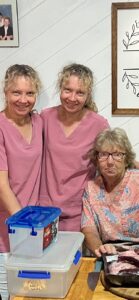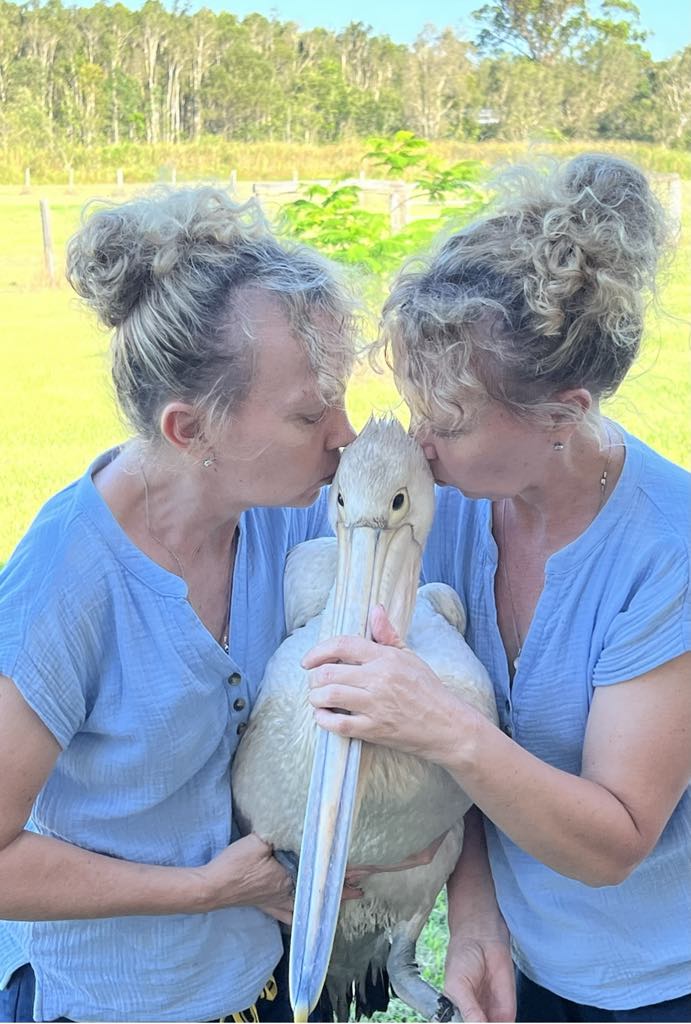Rising Costs, Resilient Hearts: The Twinnies’ Fight to Keep Saving Queensland’s Seabirds
For 25 years, Paula and Bridgette Powers, affectionately known as “The Twinnies,” along with their indomitable mother, Helen, have been rescuing and rehabilitating injured seabirds across Queensland.
Known for their “twin magic” and uncanny ability to save even the sickest birds, the pair, now in their early 50s, has rescued and rehabilitated thousands of seabirds across the state.
But as costs soar and local ecosystems deteriorate, the Twinnies are in a fight for survival.
The once-thriving sanctuary on Steve Irwin Way now faces mounting challenges.
Rising living expenses, a worsening environment on the southern Sunshine Coast, and relentless red tape have left the rescue struggling to stay afloat.
On average, they care for 30 injured birds a month – sometimes more – as habitat loss and pollution take a toll on local wildlife.
“People don’t realise what goes into this,” Helen, aged 75, says.
“If we shut down tomorrow, where would all these birds go?”
The need for donations is urgent and the rescue has launched a funding campaign to help cover escalating costs.
What once cost $75,000 a year to run has ballooned unpredictably, thanks to skyrocketing fish prices, electricity bills, and the mounting costs of vehicle maintenance for long rescue trips.
“We’re spending $1,900 now for fish that used to be $1,700 – and that’s for smaller boxes,” Helen says.
“With everything we are buying we are now getting less for more money.”
Running a seabird rescue is about more than just fish, it’s difficult and often dirty work and volunteers are essential, but hard to come by.
“Most of our volunteers are in their 70s – we have an 84-year-old who comes in here every week and cuts up all of our fish,” Helen says.
“We’ve had a few students from schools and universities, but it’s tough work, not for the faint-hearted – often we find they don’t last long.”
Despite the challenges, the Twinnies remain steadfast.
On any given day, they can be found nursing injured pelicans or driving hours to remote dams to find disoriented young birds.
“If there’s one pelican out there, they’ll sit for five hours until they bring it home,” Helen says.
“They can’t sleep if they don’t try.”
The twins’ journey began after a fateful encounter with a turtle in distress during a fishing trip.
Someone suggested calling Steve Irwin.
“I said to the Twinnies, who the bloody hell is Steve Irwin?” Helen laughs.
“Next thing you know, this bloke in khaki shows up, boots and all, straight into the water to help the turtle.”
The legendary wildlife conservationist personally mentored the girls during their time at Australia Zoo, where they honed their rescue skills before they set out independently.
“Even when they’re dealing with their own health issues, they just keep going,” Helen says.
“I think dealing with the ailments of injured birds helps them to forget their own ailments, in a sense.”

Straining Resources, Unwavering Resolve
But the current financial strain on Pelican and Sea Birds Rescue is palpable.
Electricity costs have surged to $1,700 per bill despite the installation of 16 solar panels.
Maintenance expenses for concrete paths and safe walkways for visitors, often from local retirement homes and care facilities, topped $60,000, and liability insurance alone costs $1,500 annually.
Creative workarounds have become part of daily life.
“I know how to make dollars stretch but it is getting harder and harder to do,” Helen says.
Government grants have fallen short.
“The council gave us $450 extra this year and a $15,000 grant for two years. It’s something, but it doesn’t touch the real costs,” Helen says.
Despite the grim financial outlook, the Powers family continues to receive emergency call outs from locals and fishermen who find injured birds.
“We have people call us from their boats when they see a bird in trouble. Those moments remind us why we keep going because the Twinnies can usually give them some instructions over the phone that make such a big difference.”
The family’s determination is unwavering, but Helen knows she won’t be around forever.
“The girls never complain, but they need help. I’m 75, still working seven days a week, we can’t do it alone,” she says.
“My friends call me the Eveready – like the battery.”
“They ring and say, how’s Eveready going and I say well, I haven’t died yet, got too much to bloody do.”
Through every challenge, the Powers family remains driven by an unshakable commitment to protecting Queensland’s seabirds.
You can donate to their plight via their website at twinnies.com.au or via https://twinnies-pelican-and-seabird-rescue-inc.mygiveeasy.com.

